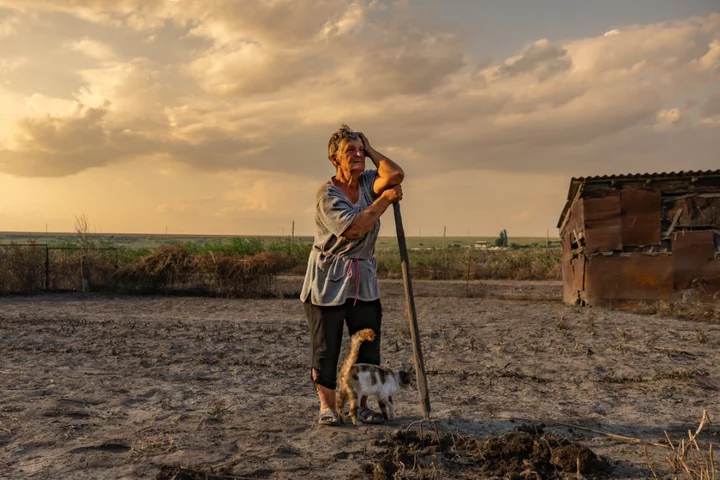
After the flood: The nightmare is just beginning for those left to rebuild after the Ukraine dam explosion
In a mud-soaked nightdress, the Ukrainian grandmother claws at the fetid water that has swallowed the steps down to her home in Kherson city. Frail and in shock, Antonia Shevchenko, 84 appears unaware of the futility of her attempts to try to drain the swamp drowning her house. Her daughter Svetlana, 64, marooned by the sweltering mud, tries to coax her to stop and calm down. Shelling roars in the background. It is the first time the pair have been back since they evacuated after the Nova Kakhokva dam blew up last month, unleashing the contents of one of Europe’s largest reservoirs over southern Ukraine. The explosion – which Ukraine blames on Russia – sparked the worst ecological disaster on the continent in recent history and will likely impact global food security, according to the United Nations. In Kherson, the capital of the region, it killed dozens of people, submerged whole towns, drowned all the wildlife and turned this street into a canal. “We didn’t even have time to get her clothes, we had to carry her in the slippers and nightie she is still wearing now,” says Svetlana in tears, as her confused mother repeats, “It’s all just mud,” in the background. “It’s impossible to fix this. I feel nothing now. Everything is just empty inside. Now it’s all gone, we have nothing left,” Svetlana adds. A few streets away Oksana Kuzminko, 70, who was also returning for the first time, picks her way through the devastation. “Welcome to zombie land,” she adds with a despairing shrug. Until recently, the only way to navigate these streets was to steer a boat between the tops of the roofs of the submerged houses. Now the waters have receded, the terrifying scale of the damage and the work still to be done has been revealed. Sewage, mud, rubbish, dead animals, bits of masonry and potentially land mines swirl together in the backyards of the partially collapsed houses. The area is still being pounded by Russian forces, stationed on the other side of the swollen banks of the Dnipro River. Anna Gatchecnko, 73, another elderly resident of this district, says the combination of floodwaters and the war is “your worst nightmare”. “We survived the Russian occupation, the shelling, and now this happened,” she says, wearing plastic bags she has tied to her feet in the toxic slush. “They took everything. My house, my belongings were the last things in this world that I had.” The Kakhovka dam – essential for fresh water and irrigation in southern Ukraine – is located in a part of the Kherson region that Moscow illegally annexed in September and has occupied for the past year. The damage is so severe that Ukraine has accused Russia of “ecocide” – believing Moscow’s forces blew it up in an attempt to prevent Kyiv’s troops from advancing in the south as they launched a counteroffensive. Moscow has vehemently denied the accusations and blamed Kyiv. Experts say the dam was so robustly built only an internal explosion could have caused such a catastrophic breach. The tearing floods have wiped out hundreds of towns and villages according to the United Nations, which has warned nearly a quarter of a million people have been left in need of drinking water. Downstream of the dam, towns and villages have morphed into polluted swamps where cholera has been detected. Upstream, the reservoir which once sustained swathes of agricultural land has turned into a salty desert. Residents in those areas queue to get water from fire trucks under shelling. And the repercussions will be felt well beyond Ukraine’s borders, potentially sparking global hunger. Ukraine – a major exporter of grains, oils and vegetables – was already struggling to export its harvest because of war. The ravages of flooding in one of the world’s most important breadbaskets will almost inevitably lead to lower grain exports, higher food prices around the world, and less to eat for millions in need. “The truth is this is only the beginning of seeing the consequences of this act,” Martin Griffiths, a United Nations aid official warned recently. It also raised fears about the stability of the Zaporizhzhia nuclear power plant, Europe’s largest, which relied on the waters of the now-dry Kakhovka reservoir to function. Rafael Grossi, head of the UN’s International Atomic Energy Agency which has unsuccessfully attempted to build a safety zone around the facility, was so concerned he travelled to the Russian-occupied plant. There he admitted it was ”grappling with ... water-related challenges”. In Zaporzhizhia’s regional capital, Taras Tyshchenko, head of the Ministry of Health’s Centre for Prevention and Disease Control, said if the Russians were capable of unleashing the waters over Kherson, they would have no qualms in taking out the nuclear power plant. Since the explosion at the dam, his health facility tests the air and waters across the region multiple times a day for radiation and contamination. So far it has detected cholera and remains on high alert for radiation. It has been through three rounds of training in the event there is a disaster at the nuclear power plant and has distributed potassium iodide tablets to those living within the danger zone. The damage from the destroyed dam is unfathomable, he says in front of the city’s main dock which is now dried out. The sweeping concrete jetty, which once hosted commercial water traffic, stoops forlornly over muddy puddles where his teams take water samples. “It could take well over a decade to fix the dam, refill the reservoirs and restore this region to normal,” he adds grimly. “And that work can only really start after victory.” In the interim, cities, towns and villages along the Kakhovka reservoir will morph into wastelands if no solution is found. Deep fissures criss-cross the cracked riverbeds where dead fish and molluscs slowly crisp in the sun. In one village, a forlorn fisherman drives a scooter across the desert scape in search of a pool of water. “Once the dam exploded we tried to build our own mini dams to try to retain some water,” explains Vitaly Marozov, 29, who works at a 400-hectare farm producing vegetables and fruit just outside of the southern city of Nikopol. He plays us a video of local volunteers building a makeshift barrier out of sacks and soil. “Now we are trying to dig wells but the water is salty,” he adds. This is already destroying crops. Standing by a destroyed field of cabbages, dusted white with salt, he says they will be lucky if they can salvage a fifth of their total yearly yield. The damage, he believes, will cost their farm 22 million hryvnias, or around £500,000, and it will only get worse as the season progresses. “We are just one farm, this is the case all around this area. This will impact global food security unless someone does something drastic,” he continues. Back in the waterlogged regions, volunteers deliver aid by boats to the communities now cut off from help. Others bring pumps to try to drain the pools of stagnant water from the worst-hit areas. But all it does is expose the irreparable damage done to the entire southern sweep of Ukraine. We find Olha Mosyk, 70, who was forced to swim to safety with a litter of newborn kittens, islanded by destruction in her home in the Mykolaiv region. Sodden muddy piles of dirt mark the remains of the walls of her house. “You need steel teeth to break Ukrainians. That won’t work on me,” she says, pulling up the remains of rotten potatoes from her destroyed field which is the same tyranny of blackened mud. “All we can do is try to pull ourselves together,” she adds with a pause. Back in Kherson city, Svetlana tries to comfort her mother, Antonia, who is on the cusp of a panic attack. “How do I feel? Crying all the time. My whole body is shaking,” the 84-year-old says faintly, her red floral nightie a flash of colour in the grey water. “It’s all flooded. My whole life is under water.” Read More Zelensky accuses Russia of plotting ‘radiation leak’ attack at Zaporizhzhia nuclear plant Ukraine's president tells other countries to act before Russia attacks nuclear plant Ukrainian soldiers rescue Russian troops left to drown after Kakhovka dam destruction Russia-Ukraine war live: Moscow ‘arrests General Armageddon’ over Wagner rebellion Recapping the revolt in Russia, through the words of 4 presidents and a mutinous warlord
2023-07-04 19:58

‘Anatomy of a Fall’ trailer sets up the Palme D’Or-winning whodunnit thriller
Justine Triet's Palme d'Or-winning whodunnit thriller, Anatomy of a Fall, is coming to cinemas and
2023-08-18 17:57
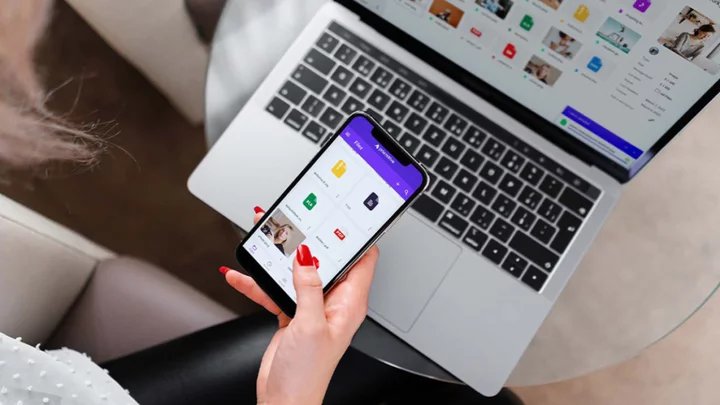
Get 10TB of lifetime cloud storage for just $90
TL;DR: As of Sept. 22, you can get 10TB (aka, a massive amount of space)
2023-09-22 17:19

FIA looking into Lando Norris’ pit-lane near-miss at Sunday’s Miami Grand Prix
Formula One’s governing body has launched an investigation following another near-miss in the pit-lane at Sunday’s Miami Grand Prix. A week after Esteban Ocon almost collided with a cluster of individuals in Azerbaijan, footage has emerged of an official – understood to be a volunteer marshal – walking in front of Lando Norris as the British driver entered the pits in his McLaren. The incident on lap five of the 57-lap race was uploaded to the Sky Sports’ F1 website, but has since been removed. An FIA spokesperson told the PA news agency: “We are aware of the incident and looking into it with local organisers.” The alarming flashpoint followed an FIA review into pit-lane safety after Ocon said the sport narrowly avoided a “disaster” when he stopped for tyres on the final lap at the previous round in Baku. An on-board camera from the French driver’s car showed dozens of people – who had gathered at the entrance to the pit-lane with the race still ongoing – scrambling to get out of his way. Ahead of last weekend’s race in the United States, the FIA updated its rulebook to prevent “mechanics from moving from their garages to the parc ferme”, and “other personnel or VIPs from entering the pit lane, until the last car has taken the chequered flag”. The FIA warned that “any infringement will result in the removal of passes from the team(s) in question from subsequent events, and potential reporting of the infringing team(s) to the stewards”. Read More Charity boss speaks out over ‘traumatic’ encounter with royal aide Ukraine war’s heaviest fight rages in east - follow live
2023-05-09 17:22

Celebrities fundraise to help strike-impacted crew by...auctioning off a custom Lena Dunham mural
Do you have any bizarre and distinct fantasies about your favorite celebrities? Perhaps you've always
2023-09-15 17:54
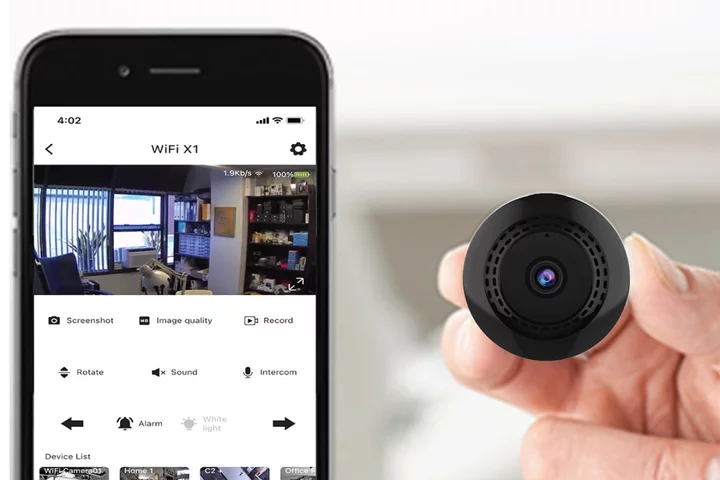
Get a portable, discreet dash cam with night vision, on sale for $61
TL;DR: As of June 24, get TOKK™ CAM C2+ Discreet Day/Night Vision Camera for only
2023-06-24 17:49

Hairspray star Sarah Francis Jones reveals she went into labour while attending Beyoncé concert
Hairspray actress Sarah Francis Jones has revealed that she went into labour while attending Beyoncé’s concert. In a video shared to Jones and her husband, actor Marcel Spears, Instagram accounts earlier this week, the Honey star spoke candidly about her experience at the show, which took place on 4 September at SoFi Stadium in Los Angeles. The post started off with the couple watching Beyoncé on stage, before the video transitioned to Jones in the hospital, as she appeared to be giving birth to her daughter. “POV: you go into labour at Beyoncé’s bday concert,” she wrote, referring to the show taking place on the singer’s 42nd birthday. Jones, who was featured in the 2007 Hairspray movie, went on to describe the unexpected experience of going into labour during the show. “We thought it was just Braxton hicks or gas,” she wrote in the caption. “Turns out we were having a whole baby at @beyonce bday show.” In the comments, many famous faces and fans congratulated Jones, while also poking fun at the timing in which started she going into labour. “CONGRATS SARAH!!! I love you so much!!!” Demi Lovato wrote, while comedian Malik Sanon added: “Your baby wanted to watch the show. Congrats bro.” “Baby girl dancing her way out at the concert!!!” a third wrote. “She said MOMMMM I NEED TO SEE QUEEN B WITH YOU WITH MY TWO EYES.” The new parents shared another joint Instagram post about the experience, which included a video of Jones at the concert and hospital, with text that read: “Beyonce induced my baby.” In the caption, Spears also added: “….stranger than fiction. God is good.” During an interview with KTLA, Jones recalled feeling contractions during the middle of the show. “I think it was right after the mute challenge,” she said, referring to concert guests pausing after Beyoncé sings the line “everybody on mute,” from her song “Energy”. “Everybody went mute. LA did very well … and then I started having contractions,” Jones continued. She emphasised that she thought the contradictions were a form Braxton Hicks, which are pains during pregnancy that are often mistaken for true labour contractions. According to Jones, as the pain continued, she took a break from dancing during show. “I said ‘Something’s happening,’” she recalled. “Usually I like to dance at the concert and I was like ‘Okay, I need to sit down for a second.’” Spears added that he first thought the contractions would “pass,” since the baby’s due date wasn’t for a few days. But as Jones’ labour pains continued, he started to time them, and noticed that the contractions were 20 to 30 minutes apart. From there, he said he and his wife made their way out of the stadium. “As the concert went on we were like ‘I don’t know about this.’ By the time we got to the car into the parking lot it was full-on intense,” he explained. The couple revealed that their newborn baby, Nola, arrived later that night on 5 September. While the baby’s first name is a reference to Spears’ hometown, the pair also noted that they haven’t decided on her middle name yet. However, they are open to a name that’s “Beyonce-like”. Spears also opened up about his and his wife’s decision to document the concert experience, sharing his belief that if they “didn’t record it,” he didn’t think “anybody would believe” what happened. “It’s just one of those things that it’s so convenient you’re like ‘Nah that’s not happening,’ but the baby definitely pulled through,” he said. The Independent has contacted Jones for comment. Read More Beyoncé fan reveals she wore wedding dress to concert to celebrate first year of marriage Keke Palmer brings boyfriend Darius Jackson to Beyoncé concert Meghan Markle has ‘adorable’ reaction after Prince Harry takes a selfie at Beyoncé concert Sophia Bush repurposes wedding dress for Beyoncé concert after Grant Hughes split Beyoncé fan reveals she wore wedding dress to concert on wedding anniversary Keke Palmer brings boyfriend Darius Jackson to Beyoncé concert
2023-09-09 00:56

AP PHOTOS: The faces of pastoralists in Senegal, where connection to animals is key
FETE FORROU, Senegal (AP) — The Fulani people — also known as the Peuhl — are believed to be the largest seminomadic ethnic group in the world, with communities stretching from Senegal to the Central African Republic.
2023-11-17 00:17
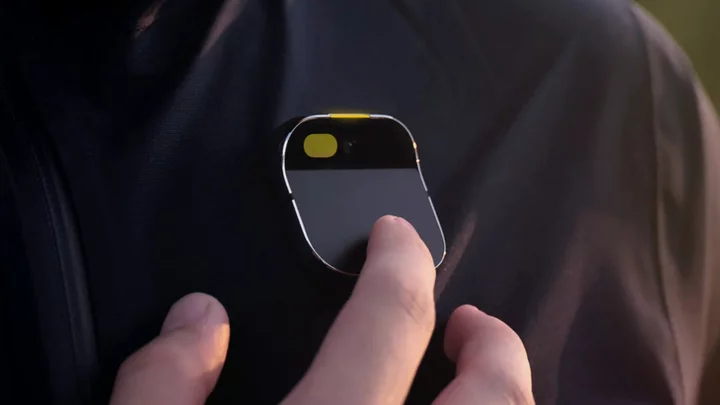
Oops: Startup Humane Quietly Corrects Ai Pin Demo Video Errors
The startup behind a Star Trek-like communicator badge has quietly fixed a demo video that
2023-11-16 09:19
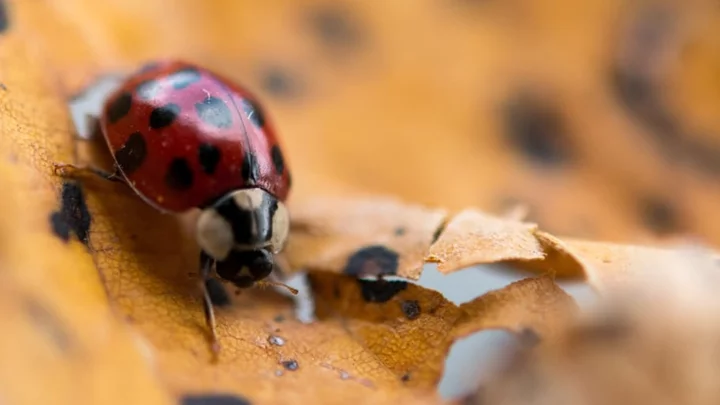
What’s the Difference Between Bugs and Insects?
The difference between bugs and insects comes down to more than just semantics. Both terms have scientific definitions.
2023-07-28 03:18
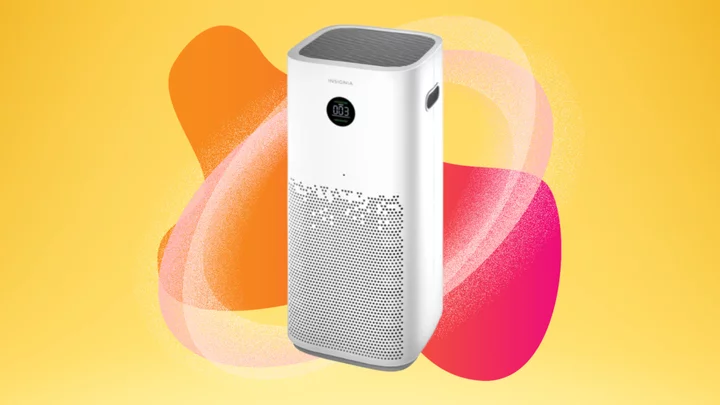
Get an Insignia air purifier for $100 off at Best Buy today only
SAVE $100: As of September 14, the Insignia HEPA air purifier is on sale at
2023-09-14 23:57
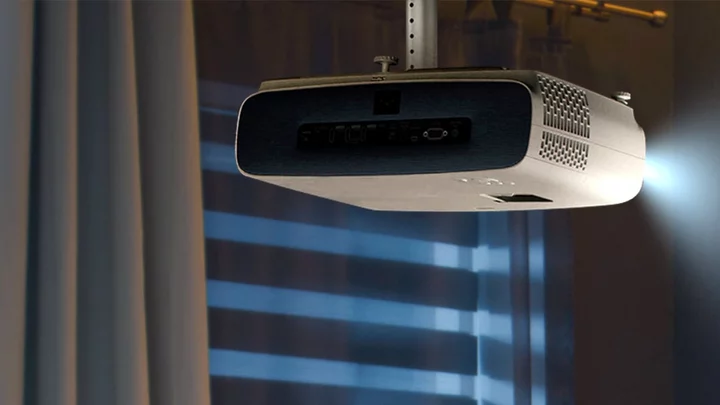
BenQ HT3560 Review
The BenQ HT3560 is a near doppelganger to the BenQ TK860i we recently reviewed. The
2023-09-29 09:48
You Might Like...
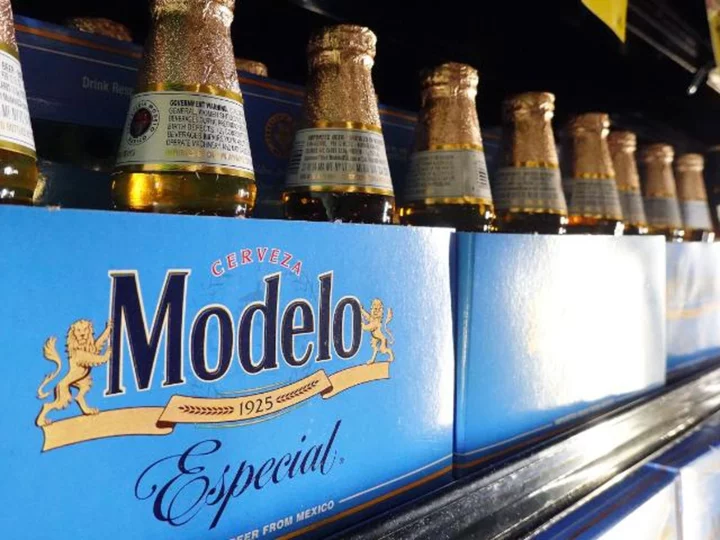
Modelo dethrones Bud Light as America's best-selling beer for 2023

Twitter ad sales down by more than half since Elon Musk takeover, report claims
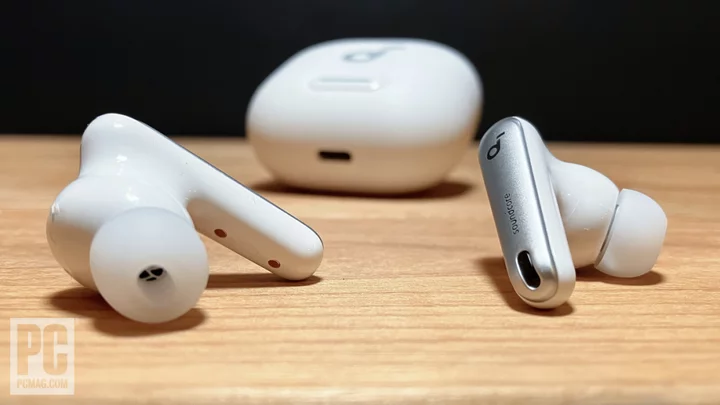
Anker Soundcore Liberty 4 NC Review

An AdGuard lifetime family plan is now just $16.97

F1 Academy announces radical team change for 2024 season
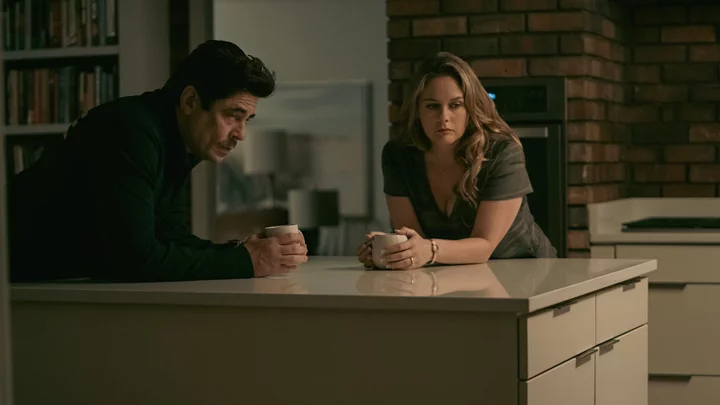
The trailer for Netflix's 'Reptile' will give you the shivers
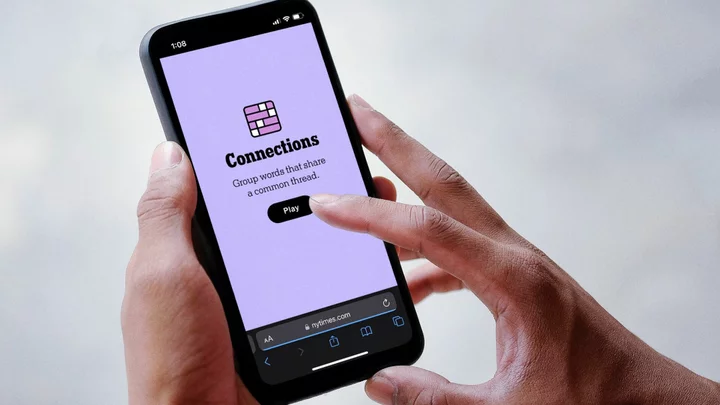
NYT Connections today: See hints and answers for November 7

Carlos Sainz fastest in second practice for Italian GP but Lewis Hamilton 17th
